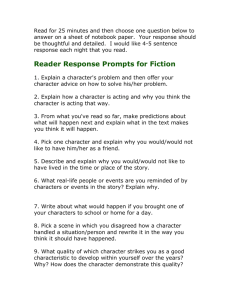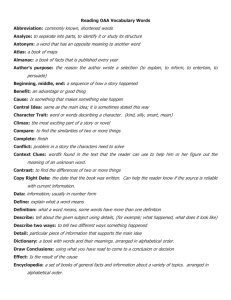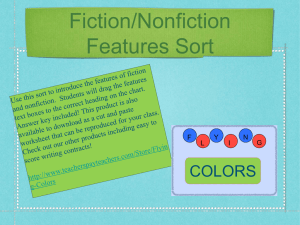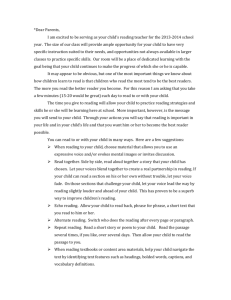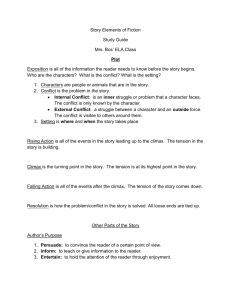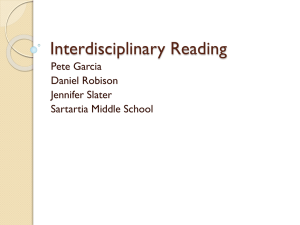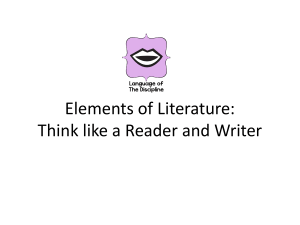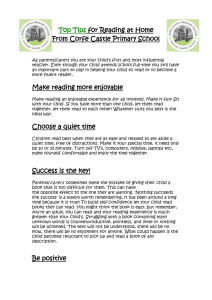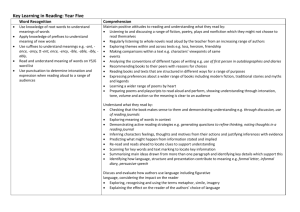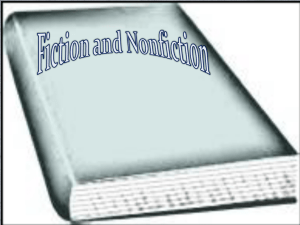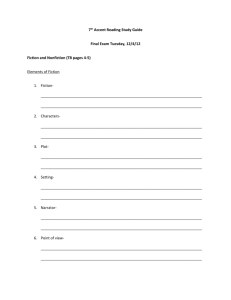3rd Grade ELA Vocab - Fabius-Pompey Central School District
advertisement
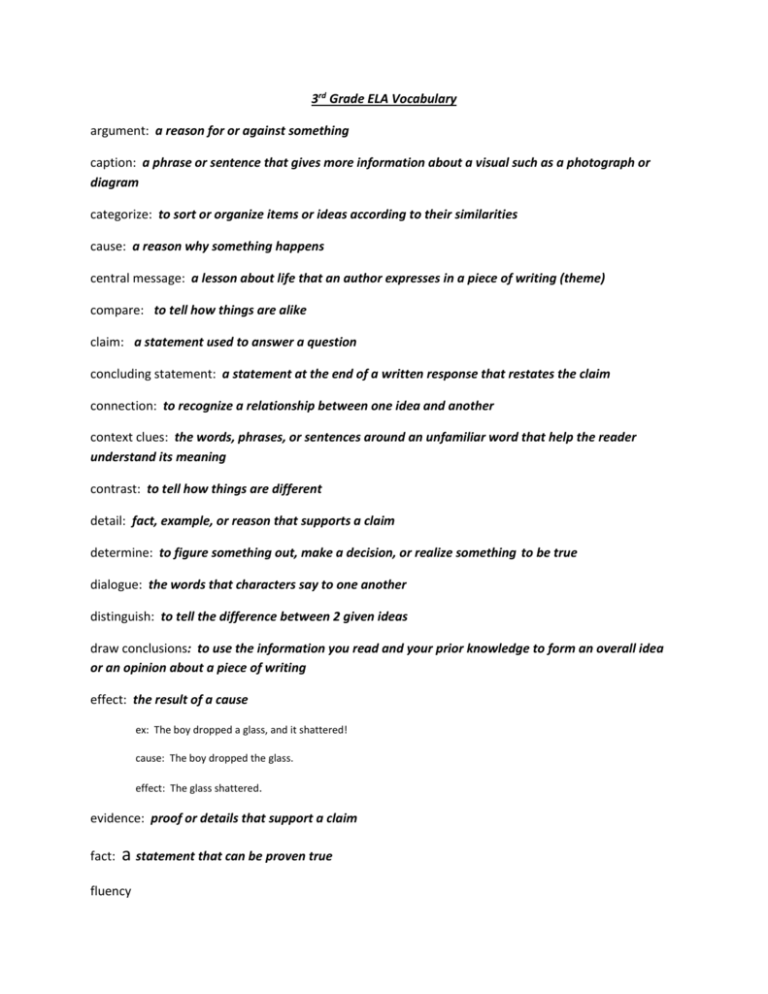
3rd Grade ELA Vocabulary argument: a reason for or against something caption: a phrase or sentence that gives more information about a visual such as a photograph or diagram categorize: to sort or organize items or ideas according to their similarities cause: a reason why something happens central message: a lesson about life that an author expresses in a piece of writing (theme) compare: to tell how things are alike claim: a statement used to answer a question concluding statement: a statement at the end of a written response that restates the claim connection: to recognize a relationship between one idea and another context clues: the words, phrases, or sentences around an unfamiliar word that help the reader understand its meaning contrast: to tell how things are different detail: fact, example, or reason that supports a claim determine: to figure something out, make a decision, or realize something to be true dialogue: the words that characters say to one another distinguish: to tell the difference between 2 given ideas draw conclusions: to use the information you read and your prior knowledge to form an overall idea or an opinion about a piece of writing effect: the result of a cause ex: The boy dropped a glass, and it shattered! cause: The boy dropped the glass. effect: The glass shattered. evidence: proof or details that support a claim fact: a statement that can be proven true fluency key details: facts, examples, or reasons that explain, describe, or prove the main idea literal: the meaning of a phrase exactly as the words are stated main idea: the overall topic/focus of a piece of writing make inferences: using details from a selection that aren’t stated directly by the author mood: the feelings and reactions that illustrations help create in a story moral: a lesson or truth about life that is usually found at the end of a fable multiple-meaning words: words that are spelled the same but are used, and sometimes pronounced differently narrator: the person or character who is telling the story nonliteral (figurative): words that mean something other than their literal, or dictionary, definitions opinion: a personal belief that cannot be proven true (how you feel about an idea) paraphrase: to restate a portion of a text in your own words while retaining the same meaning perspective: the point of view from which a story is told or an idea is shared plot : a series of events that describe the beginning, middle and end of a story point of view: the perspective from which the narrator tells a story first person: narrator is a character in the story and uses I, we, me and us third person: narrator is someone outside the story and uses he, she, they and them position prompt: an idea or topic on which to write response: a spoken or written answer root (base) word scan: to examine a text for important or specific details scene schema: the prior knowledge a reader uses to help bring meaning to text sequence: the order of events in a story or the steps in a process setting: where and when a story takes place selection: a story or passage source: person or text where information came from stanza: a group of lines in a poem summarize: to briefly retell the most important events of a story in the order that they happened support theme: a truth or lesson about life that can be found in a piece of writing visualize: to use details and descriptions from a poem or story to create a mental picture of what you read on the page voice: the way in which an author expresses his/her feelings in a piece of writing Nonfiction Text Features text features: words, phrases, and sections of a text, such as headings, lists, and sidebars, that stand out to help the reader understand the information caption: a phrase or sentence that gives more information about a visual such as a photograph or a diagram: an illustration, usually with labels and a caption charts/tables: a text feature used to organize complex information into rows and columns so that the reader can easily understand it footnote: a note of reference, explanation, or comment usually placed below the text on a printed page glossary: an alphabetical list of difficult words or technical terms usually found in the back of a book guide words: the words that are at the top of a page in a dictionary or similar book and that show the first and last words on the page graph: a diagram that shows (as by dots or lines) the change in one variable in comparison with that of one or more other variables heading: a word or phrase in bold print above a section of a text that tells what that section is about illustration: a picture that shows information to help you understand a story or article index: an alphabetical list in a printed work that gives, with each item listed, the page number where it may be found (usually in the back of a book) types of print: print that is used to make a word stand out from the other words in a text bold: darker print italic: slanted print highlighted: lightly shades print that can still be seen clearly capitalized: ALL IMPORTANT WORDS IN A TEXT ARE IN UPPERCASE. label: information that names a part of a visual, such as diagram, with a lead line that points to that part map: an illustration, or visual aid, that shows the exact location of a place photograph: a type of visual that shows what people, places, or things really look like (camera picture) sidebar: a block of text that is set off from the main text and adds new information about a topic speech bubble: a balloon that represents the words or thoughts of a character, often in a comic book or cartoon and points to that character subheadings: a title given to one of the parts or divisions of a piece of writing symbol: a letter, character, or sign used instead of a word or group of words pronunciation key: an arrangement of sounds that indicate how a word is read table of contents: a list of chapters or stories (and their page numbers) in a book in order of appearance timeline: a table listing important events for a period in history in the order in which they occurred title: the name of a piece of writing that tells what it is about vocabulary: a list or collection of words defined or explained Literary Genres genre: a particular type or category of literature fiction: a made-up story drama: a story that can be performed by actors on a stage fable : a story in which a character learns a lesson ex: “The Ant and the Grasshopper” fairy tale: a simple children’s story about imaginary beings fantasy: a work of literature set in an unreal world often with superhuman characters or monsters folktale: a story made up and handed down from the common people historical fiction: a made-up story based on real events in history myth: a story that explains how something in nature came to be Ex: “The Two Weavers” poetry: a form of literature written in lines and stanzas that often uses rhyme, rhythm, and colorful descriptions to convey ideas and feelings science fiction: a type of imaginative (made-up) literature that uses scientific knowledge short story: a made-up piece of fiction that tells a story in only a few pages tall tale: a greatly exaggerated, fictional story that often depicts wild adventures of folk heroes (Paul Bunyan and Johnny Appleseed) nonfiction: writing dealing with facts and real events autobiography: a kind of factual writing that tells the story of a real person’s life and is written by that same person biography: a kind of factual writing that tells the story of a real person’s life and is written by another person essay: a short written work giving a personal view or opinion on a topic historical nonfiction: factual literature that tells about real events and people from the past personal narrative: a true story of something that happened scientific nonfiction: a kind of informative writing that gives facts about science topics technical (informational) text: a kind of factual, informative writing that tells how to do something or how something works Conventions/Usage of English adjective (comparative/superlative) adverb capitalization noun plural predicate prefix: a word part added to the beginning of a root word that changes its meaning pronoun punctuation (period, question mark, exclamation point, comma, colon, quotation marks, parentheses, apostrophe) singular subject suffix syllable verb
